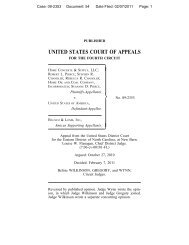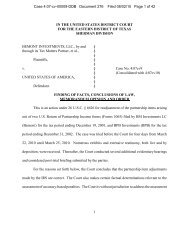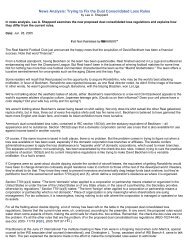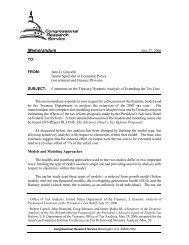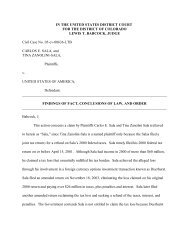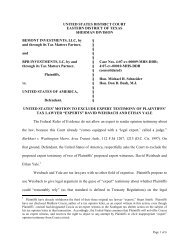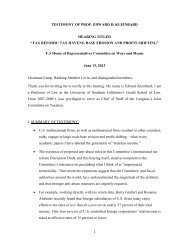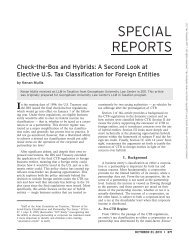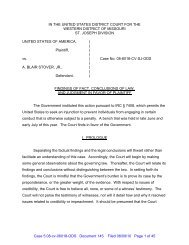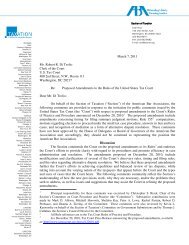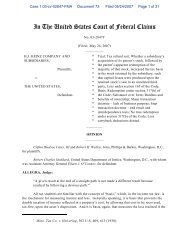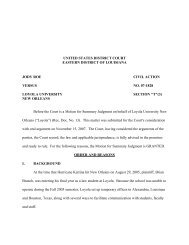Targeted Allocations Hit the Spot
Targeted Allocations Hit the Spot
Targeted Allocations Hit the Spot
Create successful ePaper yourself
Turn your PDF publications into a flip-book with our unique Google optimized e-Paper software.
COMMENTARY / SPECIAL REPORT<br />
provisions are included in <strong>the</strong> partnership agreement.<br />
Never<strong>the</strong>less, <strong>the</strong> regulations providing <strong>the</strong><br />
sale harbor for nonrecourse deduction allocations<br />
require <strong>the</strong> partnership agreement to include a<br />
qualified income offset and minimum gain chargeback<br />
provision. 25 If <strong>the</strong>se provisions are not included,<br />
partners cannot determine <strong>the</strong> allocation<br />
percentages among <strong>the</strong> partners for <strong>the</strong> nonrecourse<br />
deductions. That’s probably not a major concern,<br />
but it is an avoidable trap for <strong>the</strong> unwary.<br />
Recommendation 3: The IRS should issue a<br />
notice declaring that <strong>the</strong> section 704(b) regulations<br />
will be amended to mandate a qualified<br />
income offset and to permit partners to qualify<br />
for <strong>the</strong> safe harbor for nonrecourse deductions<br />
even if <strong>the</strong> minimum gain chargeback, partner<br />
nonrecourse debt minimum gain chargeback,<br />
and qualified income offset are not included in<br />
<strong>the</strong> partnership agreement.<br />
Partnerships without this tax boilerplate probably<br />
also run <strong>the</strong> more serious risk that if an asset<br />
subject to nonrecourse debt is sold, <strong>the</strong> mandatory<br />
minimum gain chargeback on <strong>the</strong> sale will duplicate<br />
<strong>the</strong> prior chargeback of operating income to<br />
that partner. This can occur when <strong>the</strong> partnership<br />
agreement contains <strong>the</strong> following provisions:<br />
• allocate profits first to reverse prior loss allocations;<br />
or<br />
• allocate income first to reverse negative capital<br />
accounts (note that it does not cause a problem<br />
to allocate income first to reverse negative<br />
adjusted capital accounts because <strong>the</strong> term<br />
‘‘adjusted capital accounts’’ already reflects <strong>the</strong><br />
hypo<strong>the</strong>tical minimum gain chargeback); or<br />
• allocate income first to partners who received<br />
prior allocations of losses in accordance with<br />
those losses.<br />
This is probably a common problem, even for<br />
partnership agreements that contain all <strong>the</strong> requisite<br />
boilerplate. That is because tax return preparers<br />
may not maintain up-to-date minimum gain reconciliation<br />
charts. This issue arises only if partnership<br />
allocations are subject to varying sharing ratios or<br />
priorities over time. If sharing ratios are constant,<br />
no distortion will result.<br />
The fix is easy and is reflected in standard tax<br />
boilerplate that excludes nonrecourse deductions<br />
and minimum gain from <strong>the</strong> definition of net profits<br />
and net losses. Those items are allocated under <strong>the</strong><br />
special allocation provisions.<br />
For partnerships without any of <strong>the</strong> nonrecourse<br />
debt plumbing, some self-help may be appropriate.<br />
It might be fair to read into <strong>the</strong> typical taxable<br />
income chargeback provision an exception that<br />
would carve out of that chargeback a taxable income<br />
chargeback for nonrecourse deductions that<br />
will o<strong>the</strong>rwise be covered by <strong>the</strong> minimum gain<br />
chargeback. It would be helpful for <strong>the</strong> IRS to issue<br />
a revenue ruling or notice to that effect.<br />
Recommendation 4: The IRS should issue a<br />
notice declaring that <strong>the</strong> section 704(b) regulations<br />
will be amended to provide that unless<br />
<strong>the</strong> partnership agreement explicitly provides<br />
to <strong>the</strong> contrary, profits shall not be charged<br />
back to reverse nonrecourse deductions o<strong>the</strong>rwise<br />
covered by <strong>the</strong> minimum gain chargeback<br />
provision.<br />
If <strong>the</strong> partnership has charged back operating<br />
income in an earlier year that covers nonrecourse<br />
losses, as a general rule <strong>the</strong> partnership should not<br />
be required to double up with a chargeback of<br />
minimum gain to <strong>the</strong> same partners. It would be<br />
helpful if <strong>the</strong> IRS could also confirm this point<br />
through a notice or ruling. If <strong>the</strong> IRS thought it was<br />
necessary, that ruling might narrow <strong>the</strong> scope of <strong>the</strong><br />
exception to prevent abuses.<br />
Recommendation 5: The IRS should issue a<br />
notice declaring that <strong>the</strong> section 704(b) regulations<br />
will be amended to carve out from <strong>the</strong><br />
mandatory minimum gain chargeback any<br />
gain that duplicates profits already allocated<br />
to <strong>the</strong> partner.<br />
The o<strong>the</strong>r self-help alternative under <strong>the</strong> regulations<br />
is to obtain an IRS waiver of <strong>the</strong> minimum<br />
gain chargeback requirement. 26 That provision is<br />
helpful, but probably unwieldy if it requires an<br />
advance ruling. Query whe<strong>the</strong>r tax return preparers<br />
can simply assume that <strong>the</strong> IRS will grant <strong>the</strong><br />
waiver in preparing <strong>the</strong> tax returns.<br />
6. What happens if <strong>the</strong> partnership agreement<br />
does not contain a qualified income offset provision<br />
As described above, partnership agreements<br />
include a so-called qualified income offset provision<br />
to satisfy <strong>the</strong> alternate test for economic effect.<br />
The qualified income offset covers some unexpected<br />
adjustments, distributions, and allocations<br />
to a partner. The qualified income offset occurs after<br />
allocation for minimum gain and partner minimum<br />
gain chargeback but before o<strong>the</strong>r allocations. The<br />
provision allocates items of gross book income.<br />
Partnerships that liquidate in accordance with<br />
capital accounts but fail to include a qualified<br />
income offset provision in <strong>the</strong> agreement cannot<br />
qualify for <strong>the</strong> nonrecourse deduction safe harbor<br />
or <strong>the</strong> alternate economic effect test and must run<br />
(C) Tax Analysts 2010. All rights reserved. Tax Analysts does not claim copyright in any public domain or third party content.<br />
25 Reg. section 1.704(e)(1) and (e)(3).<br />
26 Reg. section 1.704-2(f)(4).<br />
100 TAX NOTES, October 4, 2010



